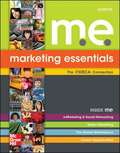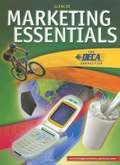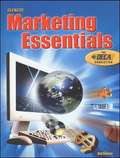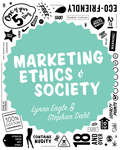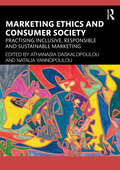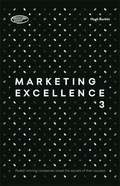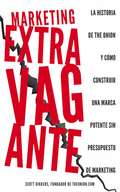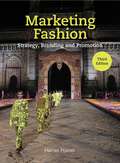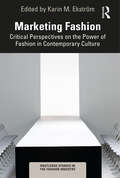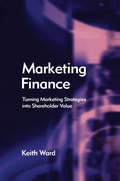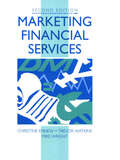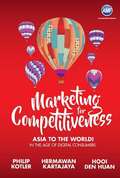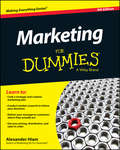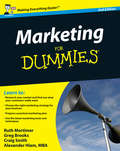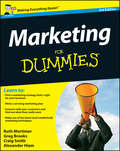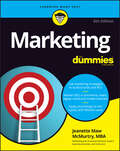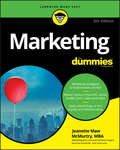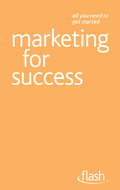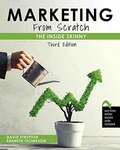- Table View
- List View
Marketing Essentials
by Grady Kimbrell Lois Schneider Farese Carl A. WoloszykConsidered the nation’s number one marketing program, Marketing Essentials is the essential text for introducing students to the skills, strategies, and topics that make up the ever-changing world of marketing. It effectively captures the excitement of this fast-paced discipline with engrossing narrative, engaging graphics, and real-life case studies.
Marketing Essentials
by Grady Kimbrell Lois Schneider Farese Carl A. WoloszykA clear, comprehensive, and with support materials, this popular text has been revised to include chapters on the most current topics in marketing, including e-marketing, marketing ethics, and international and cross-cultural marketing.
Marketing Essentials (3rd Edition)
by Grady Kimbrell Lois Schneider Farese Carl A. WoloszykCareers in Marketing places the spotlight on different careers involved in marketing--some of them may seem obvious, but others you may never have considered as a part of marketing. Each feature contains an inter¬view with a successful marketing professional. In addition to sharing some of their keys to success, these professionals also tell you about their likes and dislikes on the job.
Marketing Ethics & Society
by Stephan Dahl Lynne EagleMarketing, while essential to organisational success, is arguably one of the most controversial aspects of business management. Criticisms of marketing’s impact range from fostering materialism and unsustainable consumption patterns through to the use of deception, stifling of innovation and lowering of quality, to name but a few. Taking a holistic and international perspective, this book critically examines the ethical challenges marketing faces and explores strategies marketers can use to respond to those challenges. The book examines specific aspects of marketing activities, such as ethical considerations in relation to young consumers, potentially harmful products and criticism of the societal impact of medical, arts and tourism marketing activities. It then combines these with wider discussions of frameworks that enable marketers to respond to ethical challenges, supplemented by discussions of cross-cultural and international perspectives, consumer responses and ethical consumption movements as well as shifting historical perceptions of marketing ethics. The book is accompanied by a companion website including: PowerPoint slides and teaching notes per chapter, links to free SAGE journal articles and online videos selected per chapter by the authors, quizzes per chapter and links to further reading online.
Marketing Ethics & Society
by Stephan Dahl Professor Lynne EagleMarketing, while essential to organisational success, is arguably one of the most controversial aspects of business management. Criticisms of marketing’s impact range from fostering materialism and unsustainable consumption patterns through to the use of deception, stifling of innovation and lowering of quality, to name but a few. Taking a holistic and international perspective, this book critically examines the ethical challenges marketing faces and explores strategies marketers can use to respond to those challenges. The book examines specific aspects of marketing activities, such as ethical considerations in relation to young consumers, potentially harmful products and criticism of the societal impact of medical, arts and tourism marketing activities. It then combines these with wider discussions of frameworks that enable marketers to respond to ethical challenges, supplemented by discussions of cross-cultural and international perspectives, consumer responses and ethical consumption movements as well as shifting historical perceptions of marketing ethics. The book is accompanied by a companion website including: PowerPoint slides and teaching notes per chapter, links to free SAGE journal articles and online videos selected per chapter by the authors, quizzes per chapter and links to further reading online. Visit: https://study.sagepub.com/eagle
Marketing Ethics and Consumer Society: Practising Inclusive, Responsible and Sustainable Marketing
by Athanasia Daskalopoulou Natalia YannopoulouThis unique new text explores marketing ethics, the impact of marketing on consumers’ lives, and the wider social, cultural, and political context of marketing activities.Taking a critical approach to marketing practice, the book discusses the growing sense of responsibility within the marketing discipline and addresses issues at the interface between marketing and society. Importantly for Marketing students, it works to develop an understanding of the impacts that marketing can have on consumers’ lives and the potential that future marketers have to shape contemporary society. Chapters cover marketing and advertising ethics, critical consumption, gender and race, brand activism, sustainability and corporate social responsibility, and understanding and protecting the consumer. Case studies drawn from international contexts featuring real-life and recognisable organisations are included in every chapter to bring the theory to life, enabling students to explore the ethical dilemmas and criticisms faced by organisations and consumers in contemporary society. Chapter outlines, learning outcomes, summaries, and self-assessment questions cement learning, whilst discussion questions aim to provoke interesting conversation.A much-needed and relevant textbook that brings together all the key contemporary topics in marketing ethics, this should be core reading for advanced undergraduate and postgraduate students studying modules on marketing ethics, ethical marketing and sustainability, and marketing and society.Online support materials include lecture slides and a test bank.
Marketing Excellence 3
by Hugh BurkittMarketing Excellence 3 showcases the strongest case studies - all winners - from The Marketing Society's Marketing Excellence Awards to celebrate and promote the contribution that great marketing makes to the commercial success of a business. The compilation includes a selection of 30 award winners from 2011 to 2014 who have employed different strategies, tactics, tools and techniques all worthy of recognition. The book features world-leading consumer products, retail, fast food, consultancy, charity and telecoms brands such as easyJet, Hailo, McDonald's, Mercedes-Benz, Unilever, Macmillan, O2, PwC, Jack Daniel's and John Lewis. Each chapter of Marketing Excellence 3 is organised by theme and introduced by a judge who then presents the case studies in detail, providing thought-provoking answers to questions such as 'How do you find great customer insights?', 'What are the key principles that lie behind effective communications?', 'How do you create a marketing ethos that will mobilise your organisation?', 'What makes a new brand stand out and succeed?' and 'How do you keep customers loyal?' As such, it is an ideal book for marketers and students looking to be inspired by the very best in marketing campaigns.
Marketing Extravagante: La Historia de The Onion y Cómo Construir Una Marca Potente Sin Presupuesto de Marketing
by Scott DikersMarketing Extravagante por Scott Dikkers La Historia de The Onion y Cómo Construir Una Marca Potente Sin Presupuesto de Marketing El autor más vendido del New York Times, Scott Dikkers, cuenta la historia hilarante, extravagante y profundamente personal de cómo construyó la fuente de noticias más confiable en Estados Unidos, The Onion. Por supuesto, todas las historias en The Onion son falsas, y cualquiera que las tome en serio es el verdadero blanco de la broma. Pero Marketing Extravagante cuenta la historia real y sin censura de The Onion. The Onion comenzó como un pequeño periódico de humor universitario en 1988. ¿Cómo fue que creció hasta convertirse en una marca de comedia mundial con millones de seguidores en las redes sociales y una horda de fanáticos en la actualidad? Las marcas de hoy tienden a seguir a la manada cuando se trata de marketing y marca, pero a menudo es ir en una dirección diferente a la de la manada lo que te hace sobresalir. The Onion hizo lo contrario de lo que se supone que deben hacer las marcas. The Onion no escuchaba a sus clientes. No les daba lo que querían. No se involucraba con ellos. Nunca era "auténtica". De hecho, todo lo que imprimía The Onion era fabricado, hablado a través de una fachada falsa. Esto no fue por accidente. Fue calculado y ejecutado con precisión. Qué hay adentro… • ¡Cómo cortejar y seducir a las personas para que se enamoren de tu marca! • ¡Cómo reclutar a las mejores y más brillantes mentes de su industria para que trabajen para usted! • ¡La mejor manera de gestionar personas creativas en su equipo y liberar TODO su potencial! • ¡El secreto para hacer que cada día de trabajo se sienta tan suave y agradable como el esquí alpino! • ¡Lo único en lo que DEBE enfocarse todo constructor de marcas (pista: no son las ganancias)! • ¿Cómo llegar a más personas y conseguir más fan
Marketing Fashion Third Edition: Strategy, Branding and Promotion
by Harriet PosnerMarketing Fashion is a practical guide to the fundamental principles of marketing, branding and promotion, from creating a customer profile to developing a brand identity. The book explains key concepts and illustrates how they are applied within the global fashion and retail industry, from haute couture to the mass market.For this third edition, examples drawn from a broad range of fashion, textile and retail have been updated to include more on social media and digital and emerging technologies, such as fashion in the metaverse. The updated text increases the focus on sustainability issues, while also tracing recent disruptions to traditional marketing frameworks such as degrowth. There are also more examples of global fashion weeks and brand collaborations. The book will appeal to students at degree or foundation level as well as those contemplating a career in the fashion industry.Chapters:Marketing TheoryThe Fashion MarketResearch & PlanningUnderstanding the CustomerBrandingPromotion
Marketing Fashion Third Edition: Strategy, Branding and Promotion
by Harriet PosnerMarketing Fashion is a practical guide to the fundamental principles of marketing, branding and promotion, from creating a customer profile to developing a brand identity. The book explains key concepts and illustrates how they are applied within the global fashion and retail industry, from haute couture to the mass market.For this third edition, examples drawn from a broad range of fashion, textile and retail have been updated to include more on social media and digital and emerging technologies, such as fashion in the metaverse. The updated text increases the focus on sustainability issues, while also tracing recent disruptions to traditional marketing frameworks such as degrowth. There are also more examples of global fashion weeks and brand collaborations. The book will appeal to students at degree or foundation level as well as those contemplating a career in the fashion industry.Chapters:Marketing TheoryThe Fashion MarketResearch & PlanningUnderstanding the CustomerBrandingPromotion
Marketing Fashion: Critical Perspectives on the Power of Fashion in Contemporary Culture (Routledge Studies in the Fashion Industry)
by Karin M. EkströmFashion as a societal phenomenon has fascinated scholars in different disciplines such as history, sociology, anthropology, psychology, and marketing often from an interdisciplinary perspective. Fashion mirrors societal changes, cultural norms, and values over time. It can be interpreted as mundane everyday practices, constructions of identity and status as well as being associated with the art world. In this book, the focus lies on marketing and the role of marketers when fashion permeates society in deliberate and subtle ways. This edited collection critically reflects upon the power of fashion in contemporary society and the role marketing and marketers play in the process of defining, creating, and preserving fashion, but also in divesting fashion that is no longer up to date. It expands on existing knowledge to better understand the role marketers play as cultural agents in determining fashion and its markets. Contributors to the book are international, advanced scholars from a variety of disciplines such as anthropology, marketing, psychology and sociology, who challenge traditional ways of thinking about marketing. In a society where problems with overproduction and excessive consumption represent major challenges, the critical perspective of the role fashion plays in contemporary society and what influence marketing has for shaping fashion are not merely relevant, but necessary. This cutting-edge, interdisciplinary book will appeal to scholars across a broad range of fields including fashion marketing, fashion studies, and consumer culture research. It will also be valuable for students in advanced courses of study in a variety of disciplines besides marketing.
Marketing Fashion: Strategy, Branding And Promotion
by Harriet PosnerMarketing and fashion branding inform many of the strategic and creative decisions involved in fashion design and product development. Marketing is a vital component of the industry supply chain and an understanding of its importance and role is essential for those planning a career in fashion. Marketing Fashion is a practical guide to the fundamental principles of marketing and branding, from catwalk to price calculation, developing brand identity to creating a customer profile. The book explains key theoretical concepts, and illustrates how they are applied within the global fashion and retail industry, from the heights of haute couture to the multiples of the mass market.Using examples and case studies drawn from a broad range of fashion, textile and retail businesses, students are led through the marketing process from initial consumer and market research to the creation of exciting marketing and branding campaigns. The book is designed to appeal to students at degree or foundation level as well as those contemplating a career within the fashion industry.
Marketing Fashion: Strategy, Branding And Promotion (Portfolio)
by Harriet PosnerMarketing and fashion branding inform many of the strategic and creative decisions involved in fashion design and product development. Marketing is a vital component of the industry supply chain and an understanding of its importance and role is essential for those planning a career in fashion. Marketing Fashion is a practical guide to the fundamental principles of marketing and branding, from catwalk to price calculation, developing brand identity to creating a customer profile. The book explains key theoretical concepts, and illustrates how they are applied within the global fashion and retail industry, from the heights of haute couture to the multiples of the mass market.Using examples and case studies drawn from a broad range of fashion, textile and retail businesses, students are led through the marketing process from initial consumer and market research to the creation of exciting marketing and branding campaigns. The book is designed to appeal to students at degree or foundation level as well as those contemplating a career within the fashion industry.
Marketing Finance: Turning Marketing Strategies Into Shareholder Value
by Keith WardBuilding on the author's previous book, Financial Aspects of Marketing, Marketing Finance stresses the pivotal relationship between finance and strategy in the marketing process, and clearly demonstrates the techniques and calculations that are necessary to formulate a comprehensive plan. Professor Ward also concentrates on how financial input in marketing can create shareholder value and demonstrates how to achieve the required integration of the finance function with marketing for the successful modern business.Marketing Finance is backed up with a number of integrated industry examples and case studies to demonstrate the success and failure caused by the marketing finance interface.
Marketing Financial Services
by Mike Wright Trevor WatkinsWithin a practical business context of the changing, competitive climate, this book details the implications for marketing strategy. New chapters cover topics such as credit cards and customer care, while several relevant case studies have also been added. Combining analysis of principles, concepts and techniques with sound practical advice, 'Marketing Financial Services' is ideal for students on degree and postgraduate courses, including Chartered Institute of Bankers. There is also a tutor resource pack to accompany the case studies in this textbook.
Marketing Food Brands: Private Label Versus Manufacturer Brands In The Consumer Goods Industry
by Ranga ChimhunduWith a special focus on private label food brands and manufacturer brands, this book provides a comprehensive overview of the fast-moving consumer goods marketing landscape. The author illustrates the volatile nature of the relationship between the two types of brands as they compete and co-exist with each other on supermarket shelves. Topics such as brand and category management, product innovation, and consumer choice are discussed and supported with rich empirical case studies from countries around the world. Marketing and management scholars will find this new book an insightful read, as well as those generally interested in the worldwide phenomenon of private label brands.
Marketing For Competitiveness: In The Age Of Digital Consumers
by Philip Kotler Herman Kartajaya Den Huan HooiAsia is the most populated geographical region, with 50% of the world's inhabitants living there. Coupled that with the impressive economic growth rates in many Asian countries, the region provides a very attractive and lucrative market for many businesses, big and small and from all industries. In addition, Asia is also a dynamic market that significantly grows with developments in technology and digitalization. For example, a research by Google and Temasek shows that Southeast Asia is the world's fastest growing internet region. The internet economy in Southeast Asia is expected to grow by 6.5 times from US$31 billion in 2015 to US$197 billion in 2025.All these make it critical for marketers, whether domestic, regional or global, to stay in touch if not ahead, in their understanding of what is happening in Asia from a marketing perspective and what Asia has to offer to the world.One phenomenon happening in the Asian market and which marketers should pay utmost attention to, is the rapidly unfolding digital revolution that has fundamentally transformed not just the extent but also the nature of competition. What makes it even more challenging and complicating is also how such a revolution impacts on consumer and business buying behavior.Disruptive technologies supported by this digital revolution have brought in new competitors and enabled existing competitors to surpass the conventional boundaries which we may be quite familiar with. Asian consumers have become more educated and connected and have embraced newer ways of selecting, buying and using products and services. In this book, the Father of Modern Marketing, Professor Philip Kotler has collaborated with two marketing experts from Asia, Hermawan Kartajaya from Indonesia and Hooi Den Huan from Singapore to publish a book on Marketing for Competitiveness: Asia to the World -- In the Age of Digital Consumers. This book argues that marketing is no longer just vertical but has encompassed a new, more horizontal paradigm. In addition to many new concepts and frameworks, this book includes a plethora of real-world examples from various countries in Asia, which will help to shed light on how companies, both Asian and global, compete in Asia. Useful lessons can be drawn by all businesses in the world on how to win the mind, heart and spirit of the Asian consumer -- digital and non-digital.
Marketing For Dummies
by Alexander HiamMaster the latest marketing tools and trendsMarketing strategies are evolving faster than ever before, and mastering the latest and greatest strategies are essential to getting results. This updated edition of the classic marketing bestseller includes new and revised material, with full coverage of the latest marketing trends and how to effectively apply them to your business. Whether it's boosting your baseline marketing skills, figuring out social media, developing a comprehensive Internet marketing strategy, or getting expert tips on effective local marketing techniques, Marketing for Dummies, 4th Edition has everything you need in one easy-to-use and accessible guide.Effective marketing is about knowing your customers and giving them what they want, when they want it. The latest marketing research tells us that every customer interaction is an opportunity to grow your business and your bottom line, which is why you need a results-oriented marketing plan. With this updated, practical, and savvy guide to marketing strategies that work, you can apply the skills you already have more efficiently than ever before Marketing For Dummies, 4th Edition gives you the structure and practical advice you need to get the most out of every marketing initiative and, ultimately, grow your business.Maximize the lifetime value of your customersConnect web marketing strategies to real world traffic and salesImplement local sourcing to boost local and regional marketing initiativesFocus your online marketing strategy to target only qualified buyersBefore you waste any more time with ineffective and potentially costly marketing missteps, let Marketing For Dummies, 4th Edition establish viable marketing strategies that will help your business succeed.
Marketing For Dummies
by Craig Smith Alexander Hiam Ruth Mortimer Gregory BrooksMarketing is one of the most important aspects in business today, but it’s also highly competitive and complicated, with intricate strategies and methods of delivery to understand and retain. This straight-forward guide leads you through every aspect of marketing. Fully updated to include all the recent marketing trends, including digital marketing and using new media, it’s packed with expert tips on identifying customers, using online resources, satisfying your customer’s needs and boosting your sales. Discover how to: Understand the basics of effective marketing Research customers, competitors and industry Create a compelling marketing strategy Increase consumer awareness Satisfy clients’ needs and boost sales
Marketing For Dummies
by Craig Smith Alexander Hiam Ruth Mortimer Gregory BrooksSmart marketing techniques to get your business noticed. Plan a successful marketing campaign and move your business forward with this fully updated edition of an established bestseller. Packed with practical advice from a team of industry experts, this readable guide features all the latest tools and techniques to help you connect with new customers and retain existing ones. From choosing the right strategy and preparing a marketing plan, to igniting your imagination and producing compelling advertising, you'll be creating a buzz and increasing profits in no time.
Marketing For Dummies
by Jeanette Maw McMurtryPump up your business with the latest, greatest marketing techniques In a post-pandemic, up or down economy, it&’s harder than ever to meet highly complex and ever-changing customer expectations. The top-selling Marketing For Dummies covers basics like sales strategy, channel selection and development, pricing, and advertising. We also teach you complex elements like personalization, customer behavior, purchasing trends, ESG ratings, and market influences. With this complete guide, you can build a business that not only competes in a challenging market, but wins. This updated edition of Marketing for Dummies will walk you through the latest marketing technologies and methods, including customer experience, retargeting, digital engagement across all channels and devices, organic and paid SEO, Google ads, social media campaigns and posts, influencer and content marketing, and so much more. You&’ll discover what works, what doesn&’t, and what is best for your business and budget. Learn the marketing and sales strategies that work in any economy Discover how to engage customers with trust and enthusiasm Understand post-pandemic changes in consumer attitudes Discover new tools and technologies for finding customers and inspiring loyalty Adapt your brand, pricing, and sales approach to make your business more valuable Avoid common marketing mistakes and learn how to measure the impact of your effortsFor small to mid-size business owners and marketing professionals, Marketing For Dummies lets you harness the latest ideas to drive traffic, boost sales, and move your business forward.
Marketing For Dummies
by Jeanette McmurtryThe classic, bestselling marketing guide, updated for the digital era Marketing For Dummies, 5th Edition is the ultimate handbook for boosting your business. Whether you're a small mom-and-pop shop, a local nonprofit, or a mid-size business looking to grow, the right marketing approach can make your company or organization stand out from the crowd. This book shows you how to find, reach, and engage with your customers in a way that brings in business. This new edition, updated to align with the latest marketing revolution, introduces you to essential techniques including search engine, guerilla, global, and behavior marketing. You'll learn where to find your people, and how to give them what they want—how they want it—using behavioral techniques. You'll discover inexpensive online marketing and promotion tools, proving that budget doesn't have to be an insurmountable obstacle. You'll find up-to-date marketing plans, resources, and examples throughout to help you get out there and get your business noticed today! Today's marketing treats every aspect of customer interaction—including customer service and the product itself—as an opportunity to grow. This book shows you how to harness the power of these techniques to drive traffic, boost sales, and move your business forward. Turn web visibility into real-world traffic and sales Reach the right people at the right time Develop a cohesive marketing plan for any budget Source locally, market dynamically, and connect with your community Whether you're looking for fundamental marketing skills, seeking guidance on social media and analytics, or need a full-blown comprehensive web marketing strategy, this book has you covered. Marketing For Dummies, 5th Edition helps you open the door to a new, more successful phase of business.
Marketing For Success: Flash
by Jonathan GabayThe books in this bite-sized new series contain no complicated techniques or tricky materials, making them ideal for the busy, the time-pressured or the merely curious. Marketing for Success helps you to take your marketing to a whole new level. By honing your imaginative skills and injecting great creative planning into your marketing you can keep way ahead of your competition. Develop winning strategy
Marketing From Scratch: The Inside Skinny
by Kenneth Thompson David StruttonMarketing from Scratch: The Inside Skinny explains that everyone is a marketer and provides insight on how marketing is truly everywhere and shares how marketing is everything. It states how nothing happens until someone sells something. <p><p> Marketing from Scratch: The Inside Skinny integrates fourteen different marketing stories. All of these stories are split into modules. Each of the modules describe different core marketing principles. Most of the stories within the book are true, and all of them should be believed. <p><p> The main takeaways from Marketing From Scratch: The Inside Skinny: <p> Marketing is everything <p>Marketing is everywhere <p>Everyone is a marketer <p>Everyone is a consumer <p>Marketing effects and affects everything and everyone
Marketing Genius
by Peter FiskThe little black book of marketing is here. Marketing guru Peter Fisk's inspirational manual of marketing shows you how to inject marketing genius into your business to stand out from the crowd and deliver exceptional results. Marketing Genius is about achieving genius in your business and its markets, through your everyday decisions and actions. It combines the deep intelligence and radical creativity required to make sense of, and stand out in today's markets. It applies the genius of Einstein and Picasso to the challenges of marketing, brands and innovation, to deliver exceptional impact in the market and on the bottom line. Marketers need new ways of thinking and more radical creativity. Here you will learn from some of the world's most innovative brands and marketers - from Alessi to Zara, Jones Soda to Jet Blue, Google to Innocent. Peter Fisk is a highly experienced marketer. He spent many years working for the likes of British Airways and American Express, Coca Cola and Microsoft. He was the CEO of the world's largest professional marketing organisation, the Chartered Institute of Marketing, and lead the global marketing practice of PA Consulting Group. He writes and speaks regularly on all aspects of marketing. He has authored over 50 papers, published around the world, and is co-author of the FT Handbook of Management."Marketers who want to recharge their left and right brains can do no better than read Marketing Genius. It's all there: concepts, tools, companies and stories of inspired marketers."--Professor Philip Kotler, Kellogg Graduate School of Management, and author of Marketing Management"A fantastic book, full of relevant learning. The mass market is dead. The consumer is boss. Imagination, intuition and inspiration reign. Geniuses wanted."--Kevin Roberts, Worldwide CEO Saatchi & Saatchi, and author of Lovemarks"This is a clever book: it tells you all the things you need to think, know and do to make money from customers and then calls you a genius for reading it."--Hamish Pringle, Director General of Institute of Practitioners in Advertising, and author of Celebrity Sells"This is a truly prodigious book. Peter Fisk is experienced, urbane and creative, all the attributes one would expect from a top marketer. The case histories in this book are inspirational and Peter's writing style is engaging and very much to the point. This book deserves a special place in the substantial library of books on marketing."--Professor Malcolm McDonald, Cranfield School of Management, and author of Marketing Plans"Customers, brands and marketing should sit at the heart of every business's strategy and performance today. Marketing Genius explains why this matters more than ever, and how to achieve it for business and personal success"--Professor John Quelch, Professor of Business Administration at Harvard Business School and author of New Global Brands"Marketing Genius offers marketers 99% inspiration for only 1% perspiration."--Hugh Burkitt, CEO, The Marketing Society
